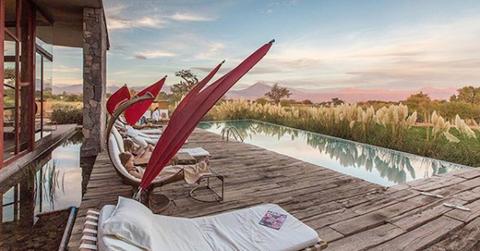This Hotel In One Of The Driest Deserts In The World Runs On Solar Power
Chile’s Atacama Desert is one of the driest places on Earth making it a perfect source for solar power. One hotel in the area has officially ended its use of diesel generators after discovering how to tap into the area's renewable energy.
Updated May 18 2019, 6:25 a.m. ET
In October, a hotel in the northern Chile town of San Pedro called Tierra Atacama announced that they were going fully solar, and shutting down all its diesel generators. That's significant because the hotel is located by the Atacama desert, which is one of the driest places in the world. Switching fully to solar energy is the logical conclusion for the region.
National Geographic reports that the panels were designed by a german company called Kraftwerk, who have used improved lithium ion batteries to create an energy source that will be capable of generating enough power for the hotel to keep them going all day. They need about 100 kWh to run at capacity, but the new solar panels generate about 156 kWh every day, which means the excess power will keep things running at night as well.
The Chilean government is deeply interested in the project at Atacama, because much of the country is reliant on old energy infrastructure, with many remote locations who can't connect to the grid reliant on diesel generators. Many would like to see the diesel replaced with greener energy options, but the lithium batteries are not without their issues. The batteries are distributed by foreign companies, like Samsung, but a lot of lithium mining goes on in Chile itself.
Locals fear that mining will disrupt towns (which have been moved completely to make way for mining in the past), and will also potentially damage the desert eco-system. But many also welcome potential jobs that could come from such industry. The conflict is a welcome reminder that cleaner solutions don't necessarily escape leaving a negative imprint on the planet and in people's lives.
However, on a smaller scale, Tierra Atacama is concentrating on making their operation more sustainable. They plan to end plastic use at the hotel, and replace bottled water with reusable containers and filtered liquid from the the local aquifer.
If it works at Atacama, it could potentially work in many other regions of Chile that experience consistent dry and sunny weather. But it will take concerted effort and communication to produce solar panels and batteries that serve the needs of all Chilean people.
